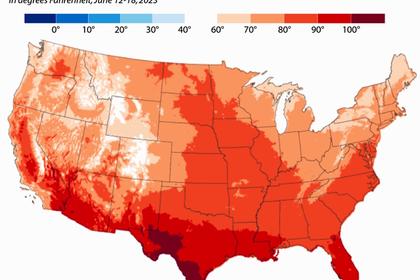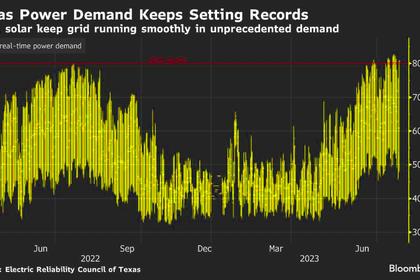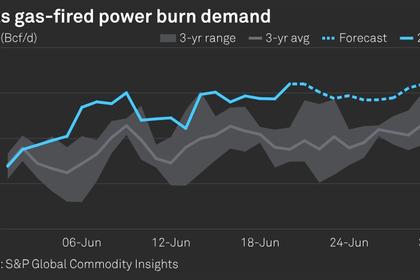TEXAS ENERGY GREED

By PATRICK MCGARRY Founder & Chief Executive Officer, Beachside Energy Consulting
ENERGYCENTRAL - Feb 19, 2024 - “If they throw it at you, I think we would take it. Who wouldn’t? But it’s not about money. And when people say it’s not about money — it’s always about money.”
- George Young, NY Giants General Manager 1979-1997
Like many of my colleagues in the energy industry, I closely watched the oral arguments two weeks ago at the Texas Supreme Court in the matter of The Public Utility Commission of Texas versus Luminant Energy Company.
Lots of talk about the rule of law, preserving competition, and ensuring reliability and how the PUCT needed to step in to save the day from a faulty black box spitting out the less than desirable result of the pricing algorithm.
“Competition is important, but it is subordinated to reliability,” Lanora Pettit, the principal deputy solicitor general at the Office of Texas Attorney General, said in court.
No mention about the money.
Allyson Ho, attorney representing Luminant energy, cut right to the chase about the actions of the PUCT February 2021.
“It jammed prices to the max. It set them there. And this argument that somehow that was necessary to preserve competition, that argument basically distills to an argument that we had to kill competition to save competition.”
Make no mistake about it.
Greed played a substantial role in ERCOT during Winter Storm Uri.
One decision by the PUCT put tens of billions of dollars in the laps of the market “winners.” Who wouldn’t take it?
What was behind the curtain for the losers?
A thirty-year securitization deal that essentially amounts to a loan the people must repay.
Call it the Bobby Bonilla Day for the citizens of Texas.
The Impact of Greed on Market Participants
Money itself is not inherently evil. But the excessive love of money and greed can lead to a wide range of negative consequences.
It can turn you into something you previously inherently opposed either in your bylaws, mission statement or soul.
It can challenge and destroy your culture as quickly as trust can be lost.
Greed can challenge company values and the rule of law in several ways:
- Compromising Ethical Standards – Greed may lead to companies to compromise their ethical standards in pursuit of financial gain. Turning a blind eye to an act that either challenges or crosses a red line in a risk policy or prior pledge to a customer.
- Undermining Trust and Integrity- When greed drives individuals to prioritize their self-interests above all else, it erodes trust and integrity within organizations, and institutions. This can weaken and undermine the rule of law by diminishing confidence in legal and regulatory systems.
- Distorting Decision Making – Greed can distort decision making processes by influencing individuals to prioritize short-term financial gains over long-term societal benefits or ethical considerations.
- Creating Inequality and Injustice- Greed often exacerbates social inequalities by concentrating wealth and power in the hands of a few, while marginalizing and exploiting others. This perpetuates injustice and undermines the principle of equality before the law, as those with greater resources may be able to manipulate legal systems to their advantage.
- Challenging Regulatory Framework- Greed-driven individuals or entities may seek to undermine or circumvent regulatory frameworks designed to ensure fair competition, protect consumers, and uphold societal welfare. This can lead to regulatory capture, where powerful interests influence or control regulatory agencies to serve their own ends, rather than the public interest.
Public Utility Commission Composition
A few years ago, I authored an article titled “We Need More Engineers” and I specifically discussed the composition of Public Utility Commissions.
The Public Utility Commission is expected to represent consumers' interests (while allowing the utility to earn enough profit). However, since they operate in a highly political setting and regulate one of the most complex processes ever devised by humanity, regulators can face conflicting incentives.
Public utility commissions face a “revolving door” problem since each new election result often brings in new regulators.
But what about the composition of these regulators?
The majority of public utilities commissioners are not engineers. Most political appointees have backgrounds in law or public service.
While you certainly need lawyers to ensure decisions are made that comply with existing public utility law, what about the need to fully understand the complexity of how the power grid works?
In truth, the power grid is a delicate mystery known to very few.
So please forgive me when I chuckle at the thought some attorneys saved the day and kept Texas from the stone ages by setting prices at $9,000 for a ridiculously extended period of time.
Despite a clear legislative mandate stating otherwise, the PUCT decided it could determine the price of electricity on its own. They knew better.
But they somehow argue their actions were about reliability and not about money?
As an old rancher once stated, “please do not pee on my boots and tell me it’s raining.”
ERCOT dispatchers with engineering backgrounds followed established protocol to deal with such emergencies saved the day.
We absolutely must require those serving on Public Utility Commissions have some engineering background.
Would we allow non lawyers to argue at the Supreme Court?
How Much Is Enough?
According to a study by London Economics International, the average market price during Uri would have been $6,578 / MWh lower than the prices which resulted from implementation of the PUCT Orders.
In a decision quickly recognized as flawed both from a legal and practical standpoint, the PUCT essentially imposed a $26.3 billion monopoly tax on buyers of electricity in the ERCOT market.
The winners quickly lawyered up to protect their windfall. Who wouldn’t take it?
Meanwhile the losers wondered what the hell just happened.
Energy markets frequently experience repricing to correct mistakes after the fact, but not this time.
Why?
It was about the money.
Specifically, tens of billions of it.
The winners fought to keep all of it because anything less would not be enough.
What about next time?
If the Texas Supreme Court over rules the decision of the Texas Court of Appeals, what precedent will be set across all energy markets?
How often will the government commandeer the market during the next crisis and at what price?
One thing is certain.
We know who will pay.
The load always pays.
---
This thought leadership article was originally shared with Energy Central's Generation Professionals Group. The communities are a place where professionals in the power industry can share, learn and connect in a collaborative environment. Join the Generation Professionals Community today and learn from others who work in the industry.
-----





















